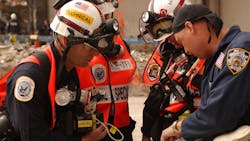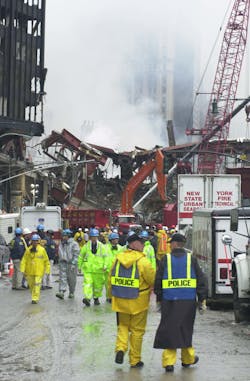There are many heroic and heartbreaking stories from that fateful day in September 2001. Whether they were from the World Trade Center, the Pentagon or Shanksville, Pennsylvania, they collectively had a dynamic impact on us as a nation. This piece is dedicated to those who lost their lives that day and those who are still battling the cancers and their wounds as well.
Most all Americans have that morning and its aftermath etched in their minds and lives thereafter. Although I was not at any of the three attack sites, here is my view on the Post-9/11 impacts made on emergency services and more so, myself.
It was Tuesday morning, September 11, 2001 in Savannah Georgia. It was a bright sunny morning, another beautiful humid day on tap. I was then the commander over the Training Unit, overseeing the academy class at the firing range that day. I received a page (yes—we had pagers back then) to immediately report to the Emergency Operations Center (EOC), for we are now at readiness level of Opcon One. This meant we are now operating at full staffing, all assets on the table and “it has hit the fan.” Back then I was on the ‘incident command team’ as it was then called; henceforth my reporting to EOC. Now, we were in the midst of hurricane season so we were at Opcon Four, on ready and stand-by if you will.
I called the 911 Center regarding the page, “WE are Under Attack” the voice at the other end replied and “get in here.” I looked up at the sky at range, only a cloud or two, nothing on my horizon. The last attack on Savannah, Georgia, was Christmas of 1865 by General Sherman. I responded and spent the next three days in around the clock, endless meetings, and target hardening strategic buildings. Meetings were held with the then local military representatives, state and federal partners. Now, this is nothing to compare with what New York, Washington, D.C. and Pennsylvania were facing. However, the lives of all emergency responders forever changed that day.Generational day reckoning
This day changed us all in some shape or fashion, it was a developmental day for all emergency responders. From the after-action reports, we had to apply lessons learned from everything within our realm. I cannot find any other date or single event that reformed all of the emergency services as this day did. When I look back to that date and track our advancements, it is reassuring. The national framework of response was the pivotal point in my career as a commander, chief and trainer. One of the best takeaways from the lessons learned here was the Homeland Security Presidential Directive #5 (February 2003). Here the Federal government has created the National Incident Management System (NIMS) and Incident Command System (ICS). This gave all who run towards the danger a commonality of command, a language and systematic approach to natural and manmade events. Yes, I drank the NIMS Kool-Aid.
From the onset of this, we all (police, fire, EMS, emergency management, communications and Federal partners) now were forced to speak the same language. One thing about law enforcement is that we are slow to embrace change; change can be hard for us to adopt to. Furthermore, we believed that we were invincible, we could handle whatever was thrown at us. Albeit, we were not, we had to improve. Of course, Fire was a leg up on this to begin with, forcing the rest to play catch-up. Which over the years, we are still catching up to speed at times. As I have traveled, I always notice the regional and vocational dialects, not every term or word means the same thing in different departments, right? The idea of a common language, commonly used forms and then all at the table to apply it for a common good, what’s not to like? One of the greatest difficulties was that of everyone playing in the same sandbox with the same toys (assets), we had to learn to share and play nice for people’s lives depend on us.
Many touted this as a unified approach and others fought it. For me as a police commander and later a chief, it redirected my efforts to see how we can improve our team response on the most dreaded dark sky day event. Not at the national or even state level but the local level where most of us operate. We are representative of very honorable professions and at times had not worked as that home team, or as we should have. Sometimes, it was like the regional playoffs for the public’s attention. I want you to stop and name a job where strangers on the worst day of their life will hand their children over to you. Here, take my child, this is my child, please help them, help me. I do not know of any professions other than us. Police, Fire and EMS are the ones that are entrusted with other’s children and family members. Therefore, since we are the trusted ones, we need to work, think and train as one.
If you create an imaginary person, for whatever reason she has now called 911 and needs help, we will call her Mrs. Smith. Now, matters not what the call for service is—motor vehicle accident, medical event or she is a crime victim. Mrs. Smith does not care what color your flashing lights are, how big your fire truck is, what color your police uniform is—she only wants and needs help now, without egos in the way. Mrs. Smith is handing her child or life over to you now.
In the Post-9/11 years, we have all been forced to the training table, multiple training events with the multi-disciplinary approach which has refined our response. I do not see the agency resentments that I once observed. As the nay-saying dinosaurs retire and we welcome the younger generation to fill their places, a couple of things occur. Granted as the older generation rotates out, we lose vast amounts of their institutional knowledge. But I feel the upcoming leaders are quick studies and are handling this well. The ‘new system’ is all that they know, it is their normal operating posture. More collaboration, less communication silos and working for a safe and common goal, we are indeed caring for Mrs. Smith better than before.
So, are we any better than we were 9/11? Yes, these past years has seen vast improvements in equipment and applied training. We have applied lessons learned from not only training but learned from past events after action reports of lessons learned. We train more globally than in the past. Rarely before then did you see the regional or county-wide training as we see now, the concept of shared assets is considered a staple within incident command.
With each passing day, we each get closer to the end of our careers. None of us want to say, I should have done more. In my eyes, our profession and fellow professions have learned, applied and are still giving it their best. I wish 9/11 would have never happened. I was once told as a child that there is always some good that will come from the bad. What good has come from the ashes of 9/11? Personally, I feel that it refocused us to become a team for a better place to live and work in. There are many who will scoff at the idea of the NIMS/ICS forced training as a waste of time. To me, I have seen it build a common foundation to start on and with, no matter what the incident may be. To me it is an intangible, the older generations may have merely tolerated it but now all of the academies teach and embrace it. This was my overall lesson learned, so I gave it my best. In closing, are we collectively where we need to be now? In this area, I feel we are not but are approaching an acceptable comfort level in competence But, once that is achieved, keep working on it. Once you are in the front, you never sit on a lead, you strive harder.
About the Author

William L. Harvey
Chief
William L. "Bill" Harvey is a U.S. Army Military Police Corps veteran. He has a BA in criminology from St. Leo University and is a graduate of the Southern Police Institute of the University of Louisville (103rd AOC). Harvey served for over 23 years with the Savannah (GA) Police Department in field operations, investigations and completed his career as the director of training. Served as the chief of police of the Lebanon City Police Dept (PA) for over seven years and then ten years as Chief of Police for the Ephrata Police Dept (PA). In retirement he continues to publish for professional periodicals and train.

